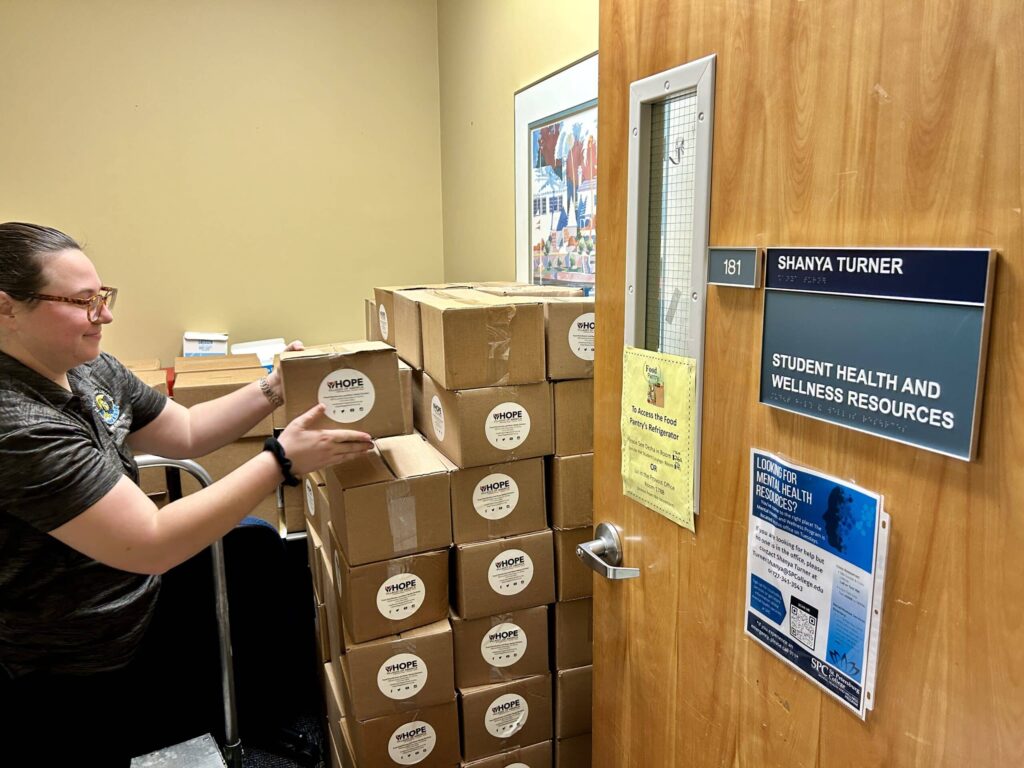
Millions of college students across the United States are facing food insecurity, struggling to afford basic necessities while pursuing higher education. Research shows approximately 30% of college students experience food insecurity, with rising tuition, housing costs and accessibility to food as significant contributing factors. This challenge has a proven impact on students’ academic performance, health and overall well-being, with many forced to choose between paying for tuition or groceries.
In response to this issue, Hope Villages of America is taking proactive steps to address food insecurity among college students. The nonprofit has partnered with St. Petersburg College (SPC) to stock campus food pantries. On Thursday, Hope Villages delivered 100 boxes of shelf-stable food to St. Petersburg College’s Health Education Center Campus in Pinellas Park, which acts as the hub for the partnership with Hope Villages of Ameria (HVA), distributing food at various SPC campus sites throughout the city.
“In 2018, we had this grassroots movement of a food pantry because we knew that we had a growing population [experiencing] food insecurity,” said Tara Newsom, a professor at SPC and the director of the college’s Center for Civic Learning and Community Engagement. “Our own SPC community tried to populate it, but we just weren’t able to keep up with the demand. When Hope Villages partnered with us, it really was a perfect collaboration because SPC is all about open access to education, and Hope Villages is about access to being able to put proper food nutrition on everyone’s table.”
Melvin Thomas, Senior Vice President of Operations for Hope Villages of America, said the nonprofit initially partnered with SPC to host mobile food pantries, bringing truckloads of food items for SPC students, faculty and the community.
“Those were like pilots for us to look at how to do that program, which became very essential to our Covid response,” Thomas said. “Food insecurity doesn’t have a look. Food insecurity can be in any house, and that doesn’t mean what people see on television with third world countries. It just means that people are not getting a guarantee where their next meal is coming from. So they need that support, and the reality is, anything can happen that leads to food insecurity. That’s definitely what Covid has taught us, that people are not okay, and that we’re no different.”
All of SPC’s food pantries are open to the public, and while their size and the amount of stocked food varies, the pantries have been so busy and often utilized that the college recently hired full-time staff to keep up with demand.

The food pantry at St. Petersburg College’s Health Education Center offers grab-and-go nonperishable items and stocks a refrigerator with yogurt, ready-to-eat meals and more.
Newsom and Thomas agree that a key component of the food pantry program is providing canned fruits and vegetables, boxed foods and shelf-stable products in a way that avoids shame and ensures those utilizing the pantry can maintain dignity during a difficult time.
“That access creates trust, and that trust allows our community to want to go to school because they know and trust that we have partners that will come to the table with us to make sure that their pathway to completion, to building skills, the pathway to work and to add value to the community is there for them,” Newsom said.
“This is a safety network that we all provide to the community. None of us can meet the whole need by ourselves,” Thomas added. “If people using the pantry need additional support, our partnership gives those at SPC access to the services that Hope Villages of America provides. It allows us to help people we see at Hope Villages with career development and education so they can get higher income jobs.”
The collaboration between Hope Villages of America and St. Petersburg College is also alleviating the challenge of food insecurity faced by many in the surrounding community. Newsom noted that the SPC Health Education Center Campus is adjacent to the Lealman neighborhood, a historically underserved incorporated Pinellas County community where data shows 28% of the population lives in poverty.
SPC’s campus food pantries have been so busy that the college recently hired full-time staff to restock the shelves and reach out to students with additional support resources.
“Income has not kept up with the rising costs of taking care of a family,” she said. “We have a lot of people moving to the area that had no idea the expense. At the downtown location, I’m finding that a lot of our younger students have moved from other states, and they are just overwhelmed with the cost of living. The services that Hope Village offers our students and our entire SPC family are important because we can’t do it, we can’t be a provider in that way. We can just be a conduit and we can create the pathways.”
The growing effort between St. Petersburg College and Hope Villages of America underscores the power of collaboration in supporting the holistic needs of college students and fostering an environment where all individuals have the opportunity to thrive, regardless of economic circumstances. Through initiatives like these, HVA and SPC leaders hope to provide an example of how coming together as organizations and combining resources and networks of care can address systemic challenges and create pathways for all residents to reach their full potential.
More information about SPC’s food pantry program can be found online here or by calling 727-341-3322. To see a list of food distribution centers and other assistance resources offered by Hope Villages of America, visit hopevillagesofamerica.org or call 727-584-3528.
Article via St. Pete Catalyst
